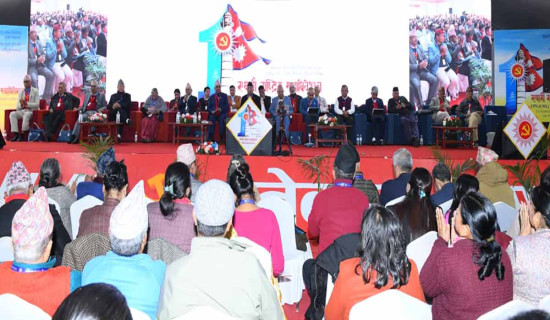- Monday, 15 December 2025
Give Priority To Quantum Computing
Quantum computing, an emerging field at the forefront of technological advancement, offers the potential to completely transform various sectors by harnessing its unique computational capabilities. Quantum computing, leveraging the fundamental principles of quantum mechanics, can perform computations beyond the capabilities of classical computers. Developed nations with sophisticated technological infrastructure have been investing significantly in this domain, recognising its potential to tackle complex issues in cryptography, materials science, drug discovery, artificial intelligence, and many others.
However, its development and deployment require substantial resources and expertise. Developing countries like Nepal face significant hurdles in establishing quantum computing facilities due to limited resources and expertise. This article aims to assess the current state of quantum computing in Nepal by examining the existing facilities, initiatives, and prospects for expansion. This short essay explores the status of quantum computing facilities in Nepal, highlighting existing infrastructure, academic and governmental initiatives, and the challenges and opportunities for future development.
Groundwork
At present, Nepal's technological landscape does not include dedicated quantum computing facilities like those found in more advanced nations. The reasons for this are multifaceted, including financial constraints, a lack of specialised expertise, and inadequate infrastructure. However, the nation's technological landscape is not devoid of interest, with several key points including education and research at academic institutions, government and policy initiatives, and private sectors and startups.
Nepal's leading higher education institutions are Tribhuvan University (TU) and Kathmandu University (KU). While these universities do not currently possess quantum computers, they have begun to include artificial intelligence, data science and analytics, neural networks, machine learning, and deep learning in their curricula. At the same time, this is the right time to offer courses related to quantum computing principles in their curricula, laying the groundwork for future advancements in the domain of quantum computing. The establishment of specialised research groups or labs dedicated to quantum computing is in the nascent stages. Quantum computing holds significant potential to enhance and transform AI by providing new computational capabilities.
The government of Nepal has recognised the importance of science and technology for national development. However, specific policies and funding directed towards quantum computing are currently lacking. There is a potential for policy development to support research and development in this cutting-edge field. Nepal government established National Information Technology Centre in 2001 with the objective of developing and promoting the information technology sector. GIDC (Government Integrated Data Center) is constructed as a high-grade data center at a national level that is used by all government entities. The private tech sector in Nepal is gradually expanding, with several start-ups focusing on AI, data science, and software development.
While none are explicitly working on quantum computing, the growth of this sector could pave the way for future investments in quantum technologies. Let us now discuss a few bits and pieces on the challenges, opportunities, and future prospects of quantum computing facilities in the country. The major challenges are resource constraints, lack of expertise, and technological infrastructure. Establishing quantum computing facilities requires significant investment in infrastructure, including advanced hardware and software, which is currently beyond Nepal's financial capacity. There is a scarcity of professionals with the necessary expertise in quantum computing. Developing a workforce skilled in this field necessitates substantial educational reforms and international collaboration.
The broader technological infrastructure, such as reliable internet and power supply, needs substantial improvement to support advanced computational research. With several significant challenges, Nepal could gradually build and improve the current technological innovation via these opportunities to equip future quantum computing facilities. By partnering with international universities and research institutions, Nepal can promote educational programmes that produce graduates skilled in quantum computing. Collaborative efforts with international universities and research institutions are crucial for skill development and knowledge transfer.
Strategic investments
Nepal government can formulate policies that incentivise research and development in quantum computing, including grants and scholarships for students and researchers, which could catalyse growth in this sector. Another opportunity could be to collaborate with neighbouring countries, such as India and China, which are rapidly advancing in quantum computing technologies and infrastructure. Bilateral research ties with these countries could provide access to shared resources and expertise. The future of quantum computing hinges on strategic investments in education, infrastructure, and international partnerships. While the immediate establishment of cutting-edge facilities may not be feasible, gradual steps can be taken to build foundational capabilities.
Higher education institutions should gradually introduce specialised courses and degree programmes in quantum computing. Also needed is a gradual leap in establishing a national research centre with engaging in collaborative research projects with international institutions to gain access to quantum computing resources and knowledge. Finally, one of the significant future prospects is policy development, which supports technological innovation and provides funding for quantum computing research. In conclusion, Nepal can gradually build the necessary foundation for developing quantum computing capabilities. Investing in this frontier technology could significantly enhance Nepal's scientific and technological landscape, positioning it as a future contributor to global quantum research, innovations, and applications.
(The author is principal lecturer at Savonia University of Applied Sciences, Finland.)
















